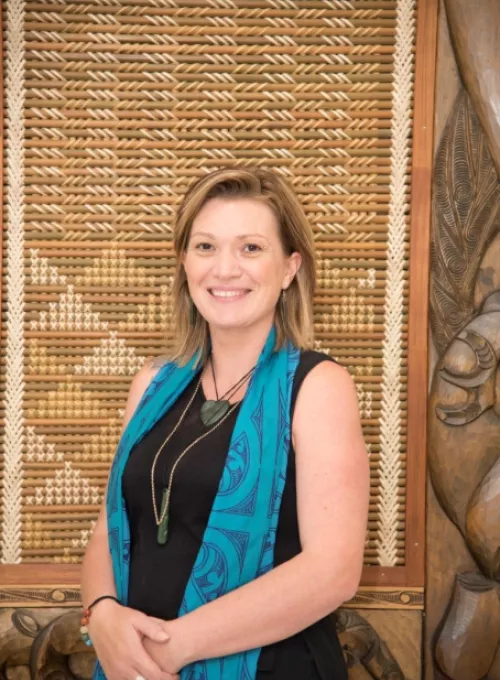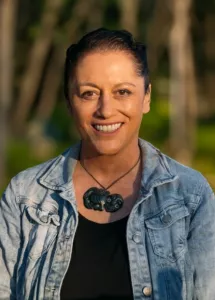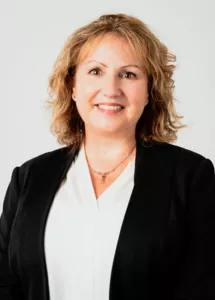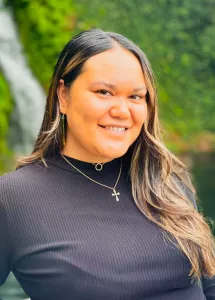Megan Tahere
Te Whānau-ā-Apanui, Ngāti Awa, Ngāti Ranginui, Ngāi te Rangi, Ngāti Porou, Ngāti Whātua, Ngāpuhi

I first came to know Megan as her external peer supervisor when she enrolled to do a Master’s Degree. I was immediately impressed by the political astuteness that she demonstrated in the first draft of her research proposal.
Megan is one of a small number of Māori midwives in practice in Aotearoa New Zealand. Of the 3122 midwives in Aotearoa New Zealand holding a practising certificate in 2017, only 9% (282) identified as being Māori. She is the first practising Māori midwife to be appointed to a Director position in a District Health Board (DHB), with Auckland DHB.
Megan co-authored a chapter in the Australasian textbook ‘Midwifery: Preparation for Practice 4e (2019), a core text for New Zealand and Australian student midwives. This chapter was introduced in 2010, and it is the first dedicated indigenous chapter in a mainstream health professional textbook, in the world.
Megan is the mother of five children, and she has two mokopuna. Her achievements to date are significant because midwifery is an expensive education programme and a demanding profession. Māori midwives face many of the same challenges as Māori women in other professions such as institutional gender bias and racism. Midwives are also required to be available for their client’s maternity needs 24 hours a day and seven days a week. Whānau support is essential for student midwives and midwives in practice who have children because most babies are born in the early hours of the morning and therefore it is important that the midwife can attend to her clients when needed. Pregnancy and childbirth are a natural phenomenon, and despite New Zealand’s continuity of care model and the latest modern technology, a woman’s physiology does not always respond well to being pregnant, and if she deteriorates suddenly, it is vital for her midwife to be able to assess her immediately. Again, whānau support is critical for a midwife to be relieved of her parental obligations to meet her professional responsibilities.
Megan graduated from the Auckland University of Technology Midwifery Programme in 2011. She was the first midwifery student to graduate with both a Bachelor of Health Science in Midwifery and a Graduate Certificate in Te Ara Hauora Māori after studying these qualifications concurrently.
Megan is currently a Trustee and the Chair of Ngā Māia ki Tāmaki Makaurau which is the Auckland regional group of Ngā Maia o Aotearoa, the national Māori midwifery professional organisation for which she is also a Trustee. She recently completed two terms as the Deputy Chair of the New Zealand College of Midwives (NZCOM) in Auckland and remains on the regional committee, and is part of multiple professional boards, advisory and working groups.
Megan wants to do the best she can for whānau and Māori women. She has a very clear understanding of the structural societal and political landscapes that impact on Māori health outcomes. She is deeply intelligent but humble. She is inquisitive, tenacious and honest.
Before commencing her role with Auckland DHB in 2018, Megan worked at Counties Manukau DHB as a core staff midwife and had just taken up her role as a Research Fellow. Alongside this, she was the Māori Midwifery Liaison, Pu Ora Matatini Midwifery Scholarship Programme Coordinator and a Clinical Educator in the Auckland University of Technology’s Midwifery Programme. In this role, she worked to significantly increase the enrolment of Māori students into the Programme and decrease the attrition rate of Māori students from the Programme by providing academic and pastoral wrap-around support and had a special interest in teaching cultural competency. While at the Auckland University of Technology she also spent some time lecturing on Māori health in the School of Interprofessional Health Studies.
Megan is currently leading an innovative Māori midwifery service and workforce strategy and structure at Auckland DHB which aims to build a unique recruitment and retention pipeline and embed professional development opportunities for Māori midwives, including equitable leadership positions. She is embarking on Doctoral study and is keen for her research to contribute toward establishing a distinct Māori midwifery programme that will help to build on the development of midwifery education for Maori women, advance the provision of maternity care and contribute to improvements in cultural competence for optimal health outcomes for Māori.
References
Chapter 10 Midwives and Māori women: advancing our relationships. Midwifery: Preparation for Practice 4th Edition 2018
Dr Hope Tupara, Ngāi Tāmanuhiri, Rongowhakaata, Ngāi Tahu, Ngāi Te Rangihouhiri, Ngāpuhi, Health Consultant



